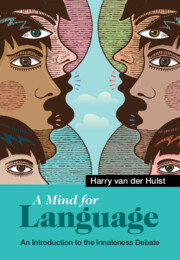Refine search
Actions for selected content:
49 results
7 - Settler Labour Poetics and the National Imaginary at the Turn of the Twentieth Century
-
-
- Book:
- The Cambridge History of Australian Poetry
- Published online:
- 19 November 2025
- Print publication:
- 11 December 2025, pp 137-149
-
- Chapter
- Export citation
Chapter 3 - “It Is Our Land Just the Same”
- from Battling the Hydra of Profitable Hate in White Newspapers
-
- Book:
- The Harlem Renaissance Weekly
- Published online:
- 19 November 2025
- Print publication:
- 20 November 2025, pp 99-129
-
- Chapter
- Export citation
1 - What This Book Is About
- from Part I - Introduction
-
- Book:
- Genes, Brains, Evolution and Language
- Published online:
- 13 November 2025
- Print publication:
- 13 November 2025, pp 3-16
-
- Chapter
- Export citation
5 - Cognitive Development, Modularity and Innateness
-
- Book:
- Evolutionary Psychology
- Published online:
- 30 October 2025
- Print publication:
- 09 October 2025, pp 117-140
-
- Chapter
- Export citation
Do Citizens Stereotype Muslims as an Illiberal Bogeyman? Evidence from a Double-List Experiment – ERRATUM
-
- Journal:
- British Journal of Political Science / Volume 55 / 2025
- Published online by Cambridge University Press:
- 28 July 2025, e95
-
- Article
-
- You have access
- Open access
- HTML
- Export citation
Christian religiosity and nativism: populist government participation as an influencing factor?
-
- Journal:
- Politics and Religion / Volume 18 / Issue 2 / June 2025
- Published online by Cambridge University Press:
- 13 May 2025, pp. 238-257
-
- Article
-
- You have access
- Open access
- HTML
- Export citation
Chapter 10 - One Career, Two Career Narratives
-
-
- Book:
- Pillars of Developmental Psychology
- Published online:
- 14 February 2025
- Print publication:
- 20 February 2025, pp 100-111
-
- Chapter
- Export citation
Do Citizens Stereotype Muslims as an Illiberal Bogeyman? Evidence from a Double-List Experiment
-
- Journal:
- British Journal of Political Science / Volume 55 / 2025
- Published online by Cambridge University Press:
- 14 February 2025, e23
-
- Article
-
- You have access
- Open access
- HTML
- Export citation
1 - Word Grammar in Its Intellectual Contexts
-
-
- Book:
- Word Grammar, Cognition and Dependency
- Published online:
- 19 December 2024
- Print publication:
- 02 January 2025, pp 19-49
-
- Chapter
- Export citation
7 - The Latin American Populist Radical Right in Comparative Perspective
- from Part II - A New Right? Ideational and Programmatic Change after the Left Turn
-
-
- Book:
- The Recasting of the Latin American Right
- Published online:
- 29 November 2024
- Print publication:
- 12 December 2024, pp 158-175
-
- Chapter
- Export citation
5 - The Right World
-
- Book:
- World of the Right
- Published online:
- 13 June 2024
- Print publication:
- 27 June 2024, pp 144-182
-
- Chapter
- Export citation
Chapter 2 - Acquisition of Number Concepts
- from Part I - Ontogeny
-
- Book:
- Numerical Cognition and the Epistemology of Arithmetic
- Published online:
- 15 March 2024
- Print publication:
- 28 March 2024, pp 51-72
-
- Chapter
- Export citation

A Mind for Language
- An Introduction to the Innateness Debate
-
- Published online:
- 13 October 2023
- Print publication:
- 21 September 2023
-
- Textbook
- Export citation
14 - Evaluating the Arguments
- from VI - Winding Up
-
- Book:
- A Mind for Language
- Published online:
- 13 October 2023
- Print publication:
- 21 September 2023, pp 485-516
-
- Chapter
- Export citation
Conceptualizing Nativism in Authoritarian Russia: From Nationalist Ideology to Antimigrant Riots
-
- Journal:
- Nationalities Papers , FirstView
- Published online by Cambridge University Press:
- 14 August 2023, pp. 1-27
-
- Article
-
- You have access
- Open access
- HTML
- Export citation
13 - The State as Trafficker: Governments and Guestworkers in World History
- from Part IV - Circulations of Laborers
-
-
- Book:
- The Cambridge History of Global Migrations
- Published online:
- 12 May 2023
- Print publication:
- 01 June 2023, pp 280-299
-
- Chapter
- Export citation
Chapter 7 - Repeat After Me …
-
- Book:
- You Can't Always Say What You Want
- Published online:
- 12 January 2023
- Print publication:
- 28 February 2023, pp 183-209
-
- Chapter
- Export citation
Taking the “Race” Out of Master Race: The Evolving Role of the Jew in White Supremacist Discourse
-
- Journal:
- Nationalities Papers , FirstView
- Published online by Cambridge University Press:
- 13 January 2023, pp. 1-25
-
- Article
-
- You have access
- Open access
- HTML
- Export citation
Is the unhappy citizen a populist citizen? Linking subjective well-being to populist and nativist attitudes
-
- Journal:
- European Political Science Review / Volume 15 / Issue 3 / August 2023
- Published online by Cambridge University Press:
- 12 January 2023, pp. 465-481
-
- Article
-
- You have access
- Open access
- HTML
- Export citation
Chapter 3 - Innateness
-
- Book:
- Cognitive Ontology
- Published online:
- 15 January 2023
- Print publication:
- 05 January 2023, pp 75-99
-
- Chapter
- Export citation
